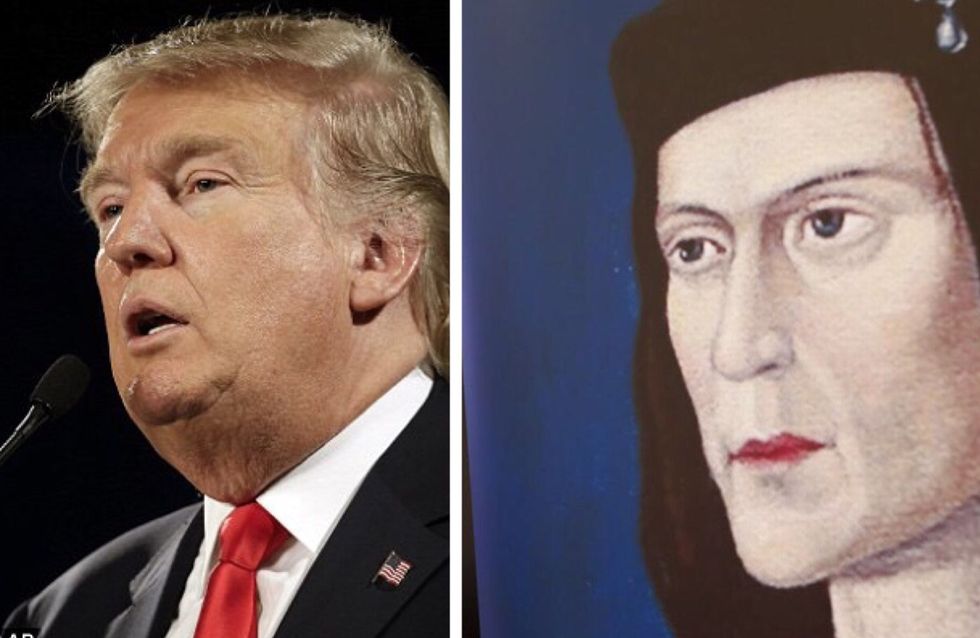It is over. #RNCinCLE. Evangeline Morphos's final words, for now, with Trump becoming Shakespeare's villain Richard III trying to instill fear of "the other" in his followers: Shall these enjoy our lands? lie with our wives?Ravish our daughters? (Richard III, V. 4)
THE MORNING AFTER
Day 4 of My Republican Hangover
by Evangeline Morphos
I'm not hung-over this morning—I have been wide awake—vigilant. I am scouring the internet looking for comfort and reassurance that Donald Trump could never succeed in his bid for the Presidency.
During the course of his mocking, savage, and cartoonish primary run, Donald Trump had constantly assured the public that he could become Presidential when necessary: 'I can be more presidential than anybody, if I want to be, I can be more presidential than anybody.I've said' this a couple of times, more presidential than anybody other than the great Abe Lincoln. He was very presidential". (March 9, 2016)
This was the night for Donald Trump to deliver on that assurance. Trump's acceptance of the Republican Party's nomination for President was his opportunity to present himself as a credible and responsible leader, and to go beyond the wild promises and vitriolic rhetoric of the primary campaign.
He failed to deliver.
Not only did Donald Trump fail to assume the attitude of a President, he demonstrated that he doesn't have the slightest notion of what a President does.
In his speech last night, Trump amplified his role of the screeching, fear-mongering, combatant whose opinions are unchecked by fact, but whose themes become familiar truths only through repetition.
On the primary trail, Trump's rallies seemed like live gatherings of a talk radio audience with Trump serving as inciter-in- chief. His bigotry was able to survive because it was labeled "honesty," and because he eschewed "political correctness." His campaign persona remained that of an entertainer, and he would often begin a speech as he did Tuesday night: "Are you having fun?"
Trump understood that his success relied on him not being Presidential:
"I can do it…You know what, I'm like a really smart person… Presidential is easy… I sort of don't like toning it down... If I acted presidential, I guarantee I wouldn't be here". Donald Trump, April 23 2016
These tactics, however, could not survive the context of a political convention. He had to "pivot" as the pundits kept reminding us. Rather than becoming "presidential," however, Trump assumed an alternative form of leadership.
In last night's speech Trump painted the portrait of a world torn by violence and fear. He accused Obama and Hillary Clinton of leaving "death, destruction, terror and weakness" in their wake. Yes, we have had painful lone wolf incidents (Sandy Hook, Charleston) and painful killing of black Americans and recently two sets of attacks on police, but we are not living in an era of daily crime. The nation essentially halved its national homicide rate since 1991.
Nevermind. Seeing crime and spreading fear, Trump presented himself as singularly capable of protecting America: "Nobody knows the system better than me. That's why I alone can fix it."
The twitter-sphere was quick to label this new role-- "dictator."
(Bernie Sanders on Twitter:"Trump: "I alone can fix this." Is this guy running for president or dictator? #RNCwithBernie")
Sanders and many others were accurately describing the role Trump was carving out for himself: "I am the Law and Order... candidate."

He had painted a portrait of America that was so dark, dangerous and defeated that it would become necessary to accept unacceptable solutions in order to survive.
Trump's high notes came through loud and clear—we need to build a wall, we need to ban all refugees, we need to do away with restrictive regulations, we need to cut all government programs that are too costly…
Trump promised to do all of these things "so fast," that he hinted at policies unmoored from legislation. Never once did Trump mention Congress—neither the House, nor the Senate. All decisions would come directly from Trump's authority.
It didn't seem to matter that Trump's claims did not square with the facts. The internet was crowded with live fact-checks as the speech proceeded. Many of Trump's claims regarding crime statistics, immigration policies, the national debt, etc. proved either false or misleading. I did a few above myself.
Relative to Hillary Clinton's e-mails, Trump acknowledged that his own imagination would override the F.B.I's actual findings: "I also know these terms are minor compared to what she actually did…terrible, terrible crimes—egregious crimes."
Trump's speech insisted on the principle of "law and order" throughout. Was he unaware that this was the coded language used in the 1968 election? Either Trump is ahistorical, which is a problem; or he is deliberately invoking the racism and bigotry of the term's original meaning, which is a different problem.
Trump's speech remarkably seemed to exist in the historical vacuum of his own autobiography. He did not refer to any other Presidents, nor to any precedents in American history. In spite of last night's theme, "Make America One Again", Trump did not invite the voters to join him, nor did he invite other Republicans to win together in November.
Trump failed to be presidential last night—and I suspect we would resist calling him a dictator. Then who was he?
I would suggest that Trump's hate-filled speech established him as a villain in American politics.
Trump's language throughout the campaign most closely resembles that of Shakespeare's ultimate villain, Richard III. Both characters are dissembling, unrepentant, monstrously arbitrary, and violent. Richard, once having achieved the crown, doesn't really know what to do with it—nor does he know how to lead.
Before his final battle, Richard addresses his troops by delivering a speech in which he creates a portrait of the enemy that is meant to instill fear in his followers:
What shall I say more than I have inferr'd?Remember whom you are to cope withal;A sort of vagabonds, rascals, and runaways,A scum of Bretons, and base lackey peasants,Whom their o'er-cloyed country vomits forthTo desperate ventures and assured destruction.You sleeping safe, they bring to you unrest;You having lands, and blest with beauteous wives,They would restrain the one, distain the other…Shall these enjoy our lands? lie with our wives?Ravish our daughters? (Richard III, V. 4)
For Shakespeare, Richard is not only a villain, but proves to be a bad leader. This speech of Richard's is proof that he should not remain in authority.
Let's hope American voters come to the same conclusion about Trump.
###
July 22, 2016


